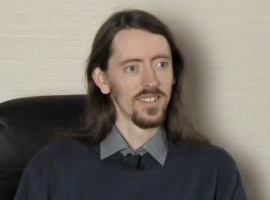InfoQ Homepage Concurrency Content on InfoQ
-
Victor Grazi on Java, Process and being a Java Champion
Victor Grazi talks to InfoQ about his popular tutorial application Java Concurrent Animated, and other things on his mind including Java, the financial industry, software development lifecycle, and being a Java Champion.

-
Richard Minerich on Functional Programming, F#, Type Providers and Dynamic Languages
Richard Minerich explains the reasons for choosing F#, how F# Type Providers help to integrate languages like R, how to bring Functional Programming to enterprise developers, and much more.

-
David Nolen on Logic and Constraint Programming, Core.logic, Mozart/Oz
David Nolen explains the ideas behind logic and constraint programming, how they're used in his Clojure core.logic library, Prolog, the features in the Oz language and Mozart/Oz, and much more.
-
Duncan Coutts on Parallelism and Concurrency with Haskell, Distributed Programming with Cloud Haskell
Duncan Coutts explains the nature of Concurrency and Parallelism in Haskell, its threading and STM implementation, Erlang OTP's influence on CloudHaskell for distributed programming, Monads, and more.

-
Omer Kilic on Erlang, Using the Actor Model for Embedded Systems, Raspberry Pi
Omer Kilic explains the use of Erlang for embedded systems and how Actors help to model hardware components and concurrency aspects. Also: the work on using Erlang to program the Raspberry Pi.

-
Erik Meijer discusses programming language design, effects and some web programming problems
Erik Meijer distinguishes between two kinds of programming languages, pure functional and all the others. He emphasizes some issues regarding mixing higher order programming with effects. Erik then talks about the nature of Javascript, and true problems we need to solve in web programming.

-
Viktor Klang on Akka, Futures and Promises, Scala
Viktor Klang talks about the features of Akka 2.x and future releases, Akka's approach to fault tolerance, the effort to unify Futures in Scala, and the state of functional programming.

-
James Spooner on Data Flow Parallelism and Hardware Acceleration
James Spooner explains how Data Flow Parallelism works and how it helps to design efficient parallel algorithms. Also: OOP vs. Parallelism.

-
Trisha Gee from LMAX Discusses Concurrent Java Programming, Agile, and Diversity in IT
In a wide-ranging interview, LMAX's Trisha Gee talks to Charles Humble about using Java for low latency programming, and the Disruptor, an open source concurrent programming framework developed by LMAX. She also discusses the agile management techniques used at LMAX, and issues around gender and ethnic diversity in IT.
-
Philip Wadler on Functional Programming
Philip Wadler talks about the role of functional programming and some of the reasons for its slow rise in the past and its influence today. Also: lambda calculus, monads, continuations and much more.

-
Rich Hickey on Datomic: Datalog, Databases, Persistent Data Structures
Rich Hickey explains the ideas behind the Datomic database: why Datalog is used as the query language, the functional programming concepts at its core, the role of time in the DB and much more.

-
John Nolan on the State of Hardware Acceleration with GPUs/FPGAs, Parallel Algorithm Design
John Nolan shows the state of hardware acceleration with GPUs and FPGAs, why it's hard to write efficient code for them, and why to favor polymorphism over if statements for performance.
